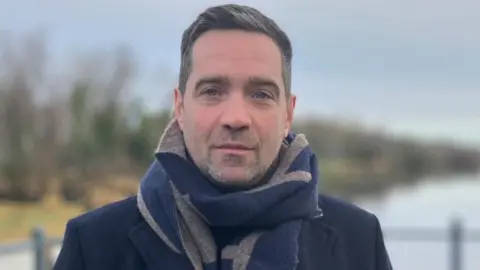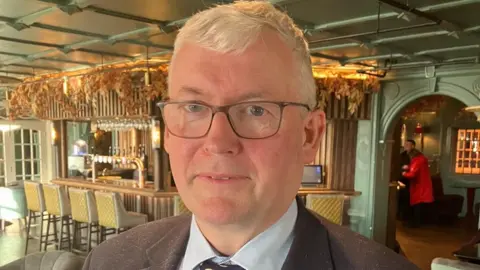Will VAT make more people in NI consider weddings in the Republic?
 BBC
BBCThe Republic of Ireland's proposed lower VAT rate will make it harder to attract weddings and conferences in Northern Ireland, a hotelier has said.
In the UK, VAT is charged at 20% compared to 13% in the Republic of Ireland and that gap is set to widen, with the rate for food-led hospitality expected to drop to 9%.
Michael Cadden, who owns Lusty Beg Island Resort in County Fermanagh, wants Stormont politicians to ask Westminster for Northern Ireland to be treated as a special case.
The Department of Finance said the minister planned to highlight the "adverse impacts of the taxation system" with the Treasury.
Mr Cadden said the disparity would affect tourism.
"That competitive disadvantage is increasing," said Mr Cadden.
"We are marketed as one island for tourism, but then having to compete on a different base price.
"We are asking for a reduced rate of VAT - whether that is parity with the Republic of Ireland - or the reduced rate we had during Covid of 5%."
Is Northern Ireland or the Republic of Ireland cheaper?
The average price of a meal or overnight stay in Northern Ireland would have been cheaper than in the Republic but Mr Cadden said that had changed over the last 10 years.
He said: "We were probably at an advantage previously, but that advantage has shrunk and is now heading the other direction.
"The cost of a hotel bedroom without VAT in Fermanagh is virtually the same in Donegal at about £130 on average.
"When we add VAT, we are charging £158, but in the Republic it's €148 (£123)."
Rising business costs
The rising cost of doing business has hit hospitality with increases in food, energy and staffing, with a further rise in national living wage and national insurance contributions in April.
Mr Cadden said: "We have a relatively low disposable income here and we are reaching a ceiling where we can no longer charge more for the same product as our costs increases, and that's not sustainable in the long term.
"We are selling pints of beer, not at a loss, but certainly £2 or £3 less than we should be to achieve margin.
"Enniskillen is one of the cheapest towns in the north to buy a pint and that is simply because our consumers don't have the disposable income to spend more."

The VAT cut has been welcomed by the Great Northern Hotel in Bundoran, County Donegal.
Michael Lennon, from Brian McEniff hotels, said it would help the hotel and the town, but he would also be in favour of a VAT reduction for Northern Ireland.
"The more people coming to the north would mean more come into this part of the north west of Ireland," he said.
"We aren't getting our fair share of the market and we need more of it.
"Customers don't know about borders - they do know about value. And if that isn't right, we are definitely going to lose out."
He said Northern Ireland was very important to the Republic's tourism industry, citing the example of the Wild Atlantic Way.
"We should be one, because we need to be attracting more people to Ireland Inc," said Mr Lennon.
"Unfortunately the international tourism market which is very valuable, 70% of them are going south [from Dublin] to Galway and we here in Donegal, Sligo and Mayo need to be focused on what's happening in the north."
Dublin or Belfast?
Sam Shephard owns the Juice Jar which has seven outlets in Northern Ireland and Great Britain.
He was considering further investment in England, but VAT is one reason why he chose Dublin instead.
"11% back in your back pocket is a huge difference. In fact, it's make or break for most businesses," he said.
"For me, Dublin is a very attractive opportunity. We've got wages which are now very similar, VAT which is lower and corporation tax which is lower."

While some overheads like rent in Dublin are more expensive, he said the advantages outweigh that.
"Yes the rent is literally twice as much as Belfast, but there is probably six times the footfall, six times the population," said Mr Shephard.
"Will people be driven across the border because prices are lower? I would say so.
"It feels punitive against the hospitality industry right now with minimum wage rises, which we all agree with but there needs to be some kind of a give."
The Department of Finance said: "VAT is an excepted matter and decisions to change the rate rest with the British Government.
"In December 2024, the department commissioned the Ulster University Economic Policy Centre to carry out an independent sectoral study into the cost of doing business here, which will cover the impact of tourism tax differentials north and south.
"The new finance minister plans to highlight the adverse impacts of the taxation system with the chief secretary to the Treasury at the next Finance Interministerial Standing Committee later this month."
